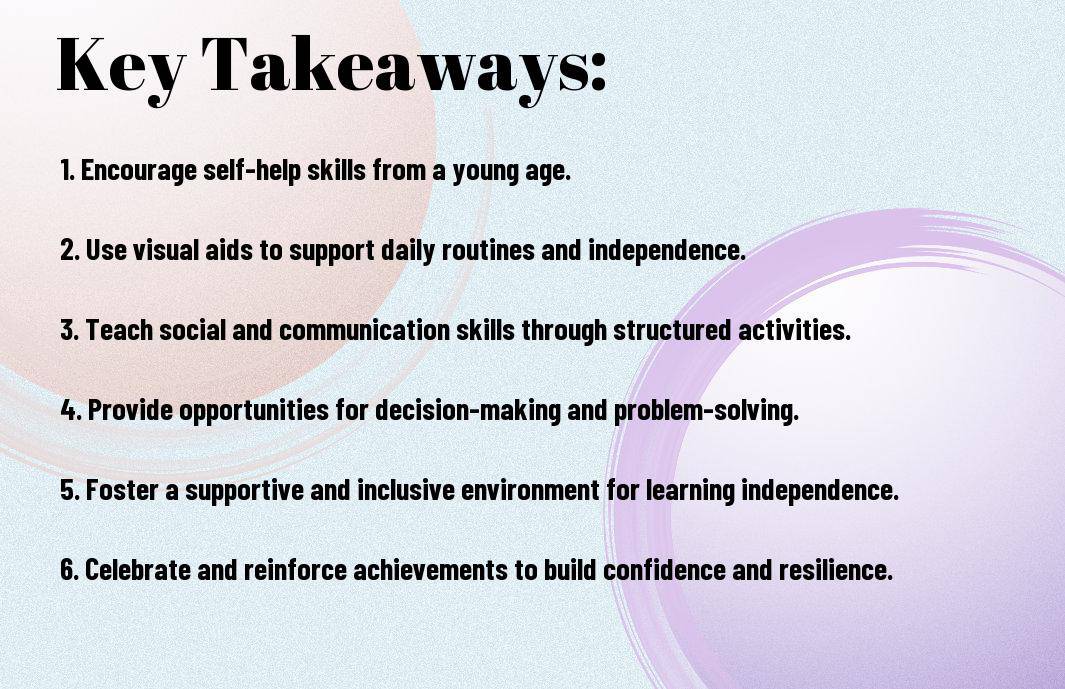Extrapolating valuable life skills to children with autism is essential in fostering their independence and overall well-being. Autism spectrum disorder (ASD) presents unique challenges and strengths, requiring tailored approaches to building independence. These individuals may face difficulties with communication, social interaction, and sensory processing, making it crucial to provide them with the necessary tools and guidance to navigate the world around them. In this blog post, we will discuss Ten Ways to Build Independence for children with autism, highlighting the key strategies and techniques that can empower them to lead fulfilling lives.
Key Takeaways:
- 1. Early intervention: It is crucial to start teaching life skills to children with autism as early as possible to build their independence.
- 2. Tailored approach: Each child with autism may have different needs and abilities, so it’s important to create individualised programmes for them.
- 3. Consistency and patience: Building life skills for children with autism requires a consistent and patient approach, with ongoing support and adjustments as they develop.

Communication Skills
Effective communication is a crucial life skill for children with autism. It plays a significant role in their overall independence and quality of life. By focusing on enhancing both verbal and non-verbal communication techniques, we can help children with autism build meaningful connections and navigate the world with confidence.
Enhancing Verbal Communication
Enhancing verbal communication skills is essential for children with autism to express their needs, thoughts and emotions. Using visual aids, such as picture cards and communication boards, can help them to associate words with objects and actions. Speech therapy can also be beneficial in improving articulation and language development, providing children with the tools they need to effectively communicate with others.
Fostering Non-Verbal Communication Techniques
For children with autism, fostering non-verbal communication techniques is equally important. This can include using sign language or gestures to help them convey their needs and desires. Sensory tools, like visual schedules and social stories, can also support their understanding of social cues and non-verbal communication. By embracing these techniques, we can empower children with autism to express themselves and interact with their environment in a meaningful way.
It’s important to note that while non-verbal communication techniques are valuable, they should not replace verbal communication entirely. Instead, they should be used in conjunction with verbal communication to provide children with a comprehensive set of tools for expressing themselves.
Personal Care and Hygiene
When it comes to children with autism, personal care and hygiene can be challenging. However, it is important to teach them these essential life skills to help them become more independent.
Establishing a Routine
One of the key ways to help children with autism learn personal care and hygiene is by establishing a consistent routine. This provides structure and predictability, which can help reduce anxiety and resistance to tasks such as brushing teeth, bathing, and getting dressed. Consistency is crucial in helping children with autism understand and follow through with these tasks. It can also be beneficial to use visual schedules and timers to help them understand and anticipate what comes next in the routine.
Teaching Self-Care Skills Step by Step
Breaking down self-care tasks into smaller, manageable steps can make it easier for children with autism to learn and master these skills. Patience and repetition are key in this process, as well as providing clear and simple instructions. For example, teaching tooth brushing may involve demonstrating the steps, then helping the child physically guide their hand through the motions. Positive reinforcement is also important to encourage and motivate them as they progress.
It is important to be aware of the individual needs and abilities of each child with autism when teaching self-care skills. Some children may require more support and guidance, while others may be capable of learning certain tasks independently. Being sensitive to their sensory preferences and challenges is crucial in creating a comfortable and effective learning environment.

Social Interaction and Play
Children with autism often struggle with social interaction and play, which are essential life skills for building relationships and navigating the world around them. It is important for parents and caregivers to focus on teaching and nurturing these skills in order to help children with autism thrive in social settings.
Integrating Social Skills Training
Integrating social skills training into daily routines and activities can be highly beneficial for children with autism. This can involve setting up structured social situations, such as turn-taking games or structured conversations, and providing clear and consistent guidance on appropriate social behaviours. It is important for parents and caregivers to model and reinforce positive social interactions, and to provide plenty of opportunities for children to practice and develop their social skills.
Encouraging Play to Build Social Understanding
Encouraging play that involves interactions with peers can help children with autism build their social understanding. This can include activities such as pretend play, cooperative games, and role-playing scenarios. By engaging in these activities, children can develop their empathy, communication, and problem-solving skills, while also learning how to navigate the complexities of social relationships.
It is important to create a supportive and inclusive environment that encourages children to engage in play and interact with others. By providing the right tools and guidance, children with autism can build their social understanding and develop crucial life skills that will help them to flourish in social situations.
Safety and Awareness
Ensuring the safety and awareness of children with autism is crucial in building their independence. It requires a proactive approach to teach them essential life skills that will help them navigate the world confidently.
Inculcating Safety Skills
Teaching safety skills to children with autism is essential to help them understand potential dangers and how to protect themselves. This includes educating them about road safety, stranger danger, and personal space boundaries. Repetition and visual aids can be particularly effective in reinforcing these concepts, as individuals with autism often respond well to consistent routines and visual cues. It is also important to tailor safety training to each child’s specific needs and abilities, addressing any sensory sensitivities or communication challenges they may have.
Developing Awareness and Response to Emergency Situations
Building awareness and teaching children with autism how to respond to emergency situations is paramount for their safety. This involves role-playing scenarios to help them understand what to do in case of a fire, medical emergency, or natural disaster. It is also crucial to establish clear communication systems that the child can utilise during emergencies, ensuring they know how to seek help or follow instructions if needed. Additionally, incorporating sensory cues and practice drills can help them feel more prepared and less anxious about potential emergency situations.
Further to preparing children with autism to recognise and respond to emergency situations, it is important to work closely with professionals to develop personalised plans that cater to the specific needs and abilities of the child. These plans should be regularly reviewed and adapted as necessary to ensure the child’s safety and wellbeing in all situations.

Education and Vocational Skills
Education and vocational skills are vital for children with autism as they prepare to transition into adulthood. These skills help them to become independent and lead fulfilling lives.
Adapting Educational Strategies
Children with autism may require individualised educational strategies to cater to their unique learning needs. It is important to work closely with teachers and specialists to create a tailored education plan that supports their strengths and addresses their challenges. This may involve using visual aids, learning in smaller groups, or incorporating structured routines to help them stay focused and engaged.
Preparing for Vocational Opportunities
As children with autism grow older, it is crucial to begin preparing them for future employment. This involves identifying their skills and interests and exploring different vocational opportunities that align with their strengths. Additionally, vocational training can help them develop essential job skills and prepare them for the workforce.
Parents and educators can support children with autism by partnering with vocational services and providing mentoring opportunities to help them gain real-world experience and build confidence in their abilities.
Building Independence – Life Skills for Children with Autism
In conclusion, it is essential for children with autism to develop life skills that will enable them to lead independent and fulfilling lives. By providing them with the necessary support and resources, we can help these children learn essential skills such as communication, social interaction, and daily living routines. It is important for parents, educators, and caregivers to work together to create a supportive environment that encourages the development of these life skills. With the right guidance and patience, children with autism can indeed become more independent and capable of navigating the challenges of everyday life.
FAQ
Q: What is the ‘Building Independence – Life Skills for Children with Autism’ programme?
A: The ‘Building Independence – Life Skills for Children with Autism’ programme is a comprehensive training programme designed to teach essential life skills to children with autism, helping them to become more independent in their daily lives.
Q: Who is the target audience for this programme?
A: This programme is specifically designed for children with autism who are seeking to develop essential life skills in order to increase their independence.
Q: What specific life skills are covered in the programme?
A: The programme covers a wide range of life skills, including but not limited to personal hygiene, time management, meal preparation, money management, social skills, and household chores.
Q: How is the programme structured and delivered?
A: The programme is structured in a systematic manner, with each skill broken down into manageable steps. It is delivered through a combination of interactive activities, visual aids, and practical exercises to ensure effective learning and retention.
Q: What are the benefits of enrolling in this programme for children with autism?
A: By participating in this programme, children with autism can gain valuable life skills that will empower them to lead more independent and fulfilling lives. These skills can also improve their self-esteem and confidence, and enhance their overall quality of life.
Q: Who are the instructors and what qualifications do they have?
A: Our instructors are highly trained professionals with extensive experience in working with children with autism. They possess relevant qualifications and expertise in special education and autism intervention.
Q: How can parents and guardians support their children in applying the skills learned in the programme?
A: Parents and guardians play a crucial role in reinforcing the skills learned in the programme. We provide support materials and guidance to help parents and guardians effectively support their children in applying the skills in real-life situations.







